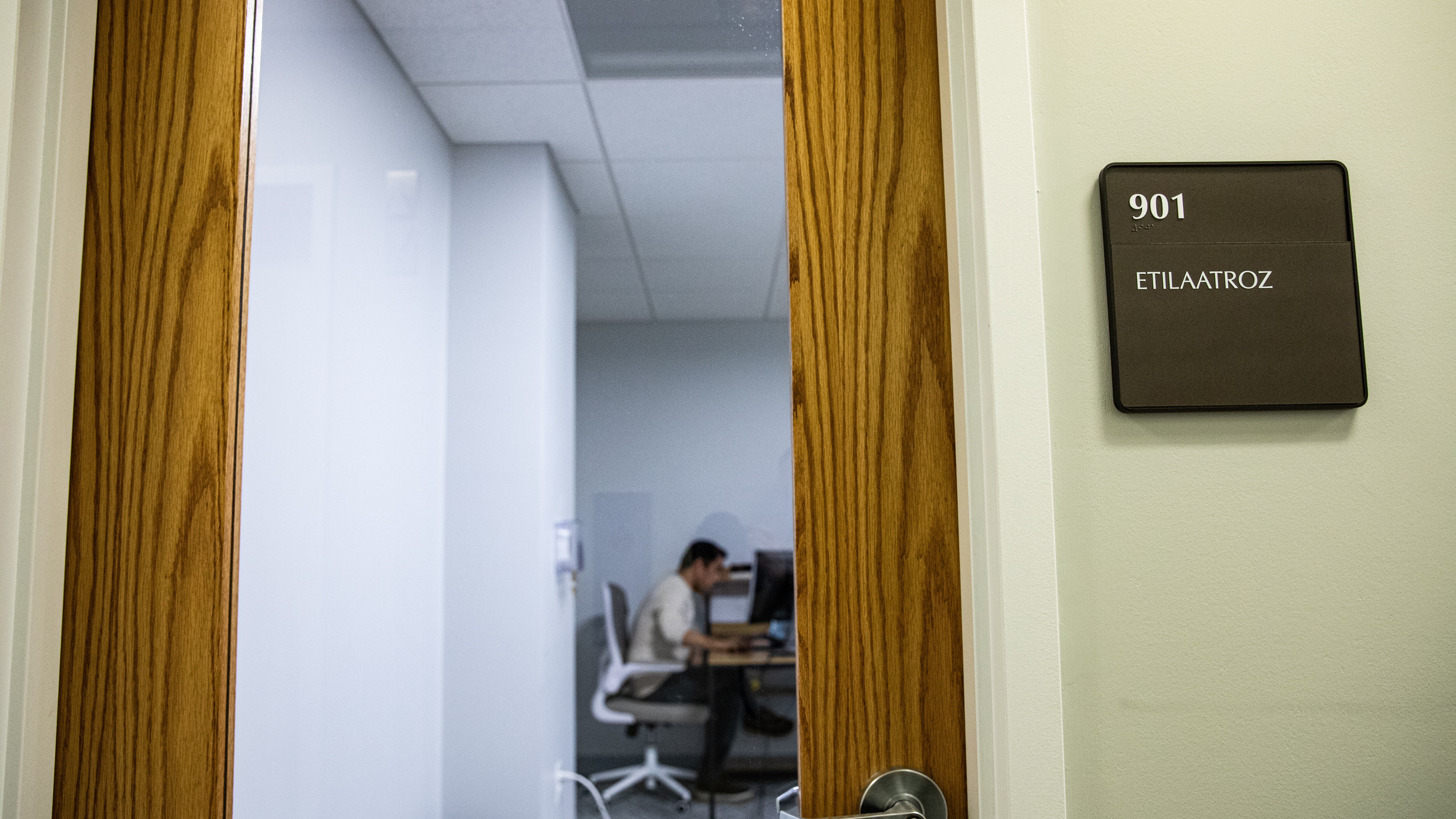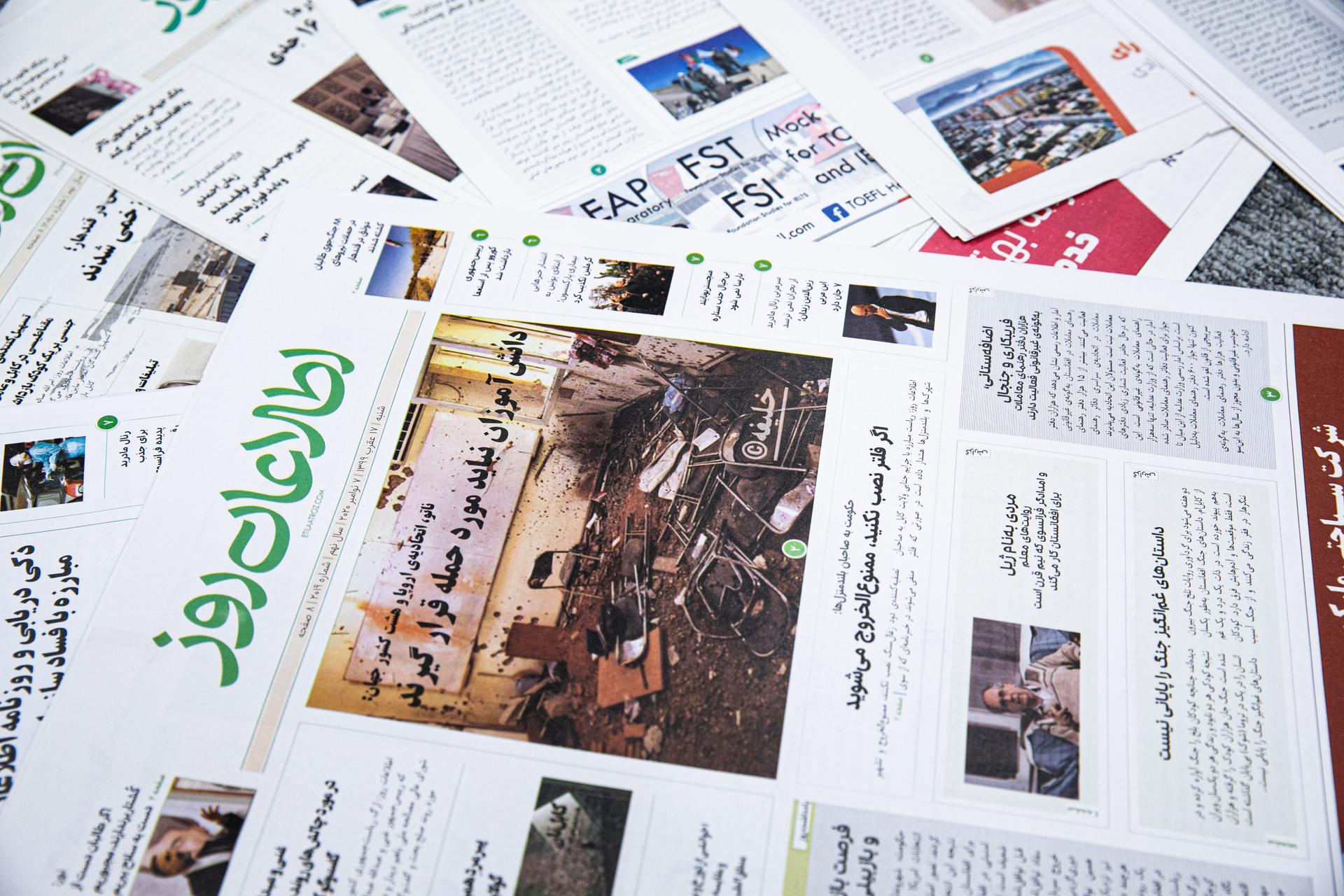Prominent Afghan news organization reports on life under Taliban rule from Maryland
In the days leading up to the Taliban takeover in Afghanistan in August 2021, Zaki Daryabi, founder and publisher of Etilaatroz, an investigative newspaper in Kabul, coordinated with his journalists to keep working as safely as they could.
But that soon proved to be too dangerous. When Kabul fell, the Taliban cracked down on Afghan media organizations and banned most news sites.
“Unfortunately, there were a lot of restrictions that kept coming and we faced a lot of problems. Our colleagues were tortured by the Taliban,” he said.
Etilaatroz never stopped reporting, even when the Taliban regained control of the country. Many journalists were forced to leave Afghanistan, including Zaki Daryabi who came to the US in October 2021. But he remained focused on his work.
“I feel like after 10 years, my biggest dream and responsibility was to keep Etilaatroz alive,” Zaki Daryabi said.
Last summer, Zaki Daryabi pulled together a team of seven staffers in an office building in Silver Spring, Maryland, just miles outside of Washington, DC.
“Fortunately, I could bring some of my colleagues here to Silver Spring,” he said.

Some even managed to bring with them bundles of print editions of the newspaper from over the years — to preserve what otherwise would surely have been lost at the hands of the Taliban.
Today, 45 Etilaatroz journalists are spread around the world, from California, to Spain, to Turkey.
Daryabi said that the readership has significantly increased over the last two years, and they are publishing more articles now compared to before the fall from more areas in Afghanistan. Their social media presence has also ramped up a lot.
A reminder ‘to keep going, not to give up’
Zaki Daryabi started Etilaatroz — which means “daily information” in Dari — in Afghanistan in 2012. It has grown since then, going online in 2013.
He also launched KabulNow, an English-language news website. Etilaatroz also published a daily print edition that circulated in Kabul — the last print edition came out on Aug. 15, 2021, the day the Taliban came into power.
Less than a month later, Zaki Daryabi’s younger brother, Taqi Daryabi, was detained and severely beaten by the Taliban while filming a women’s protest with another reporter in downtown Kabul.
The incident “keeps me strong [enough] to keep going, not to give up,” Taqi Daryabi said.

Photos of Taqi Daryabi’s abuse were widely shared in the media, and he said that he still suffers from nightmares. Today, he still works with Etilaatroz, editing videos for the website and social media from the Maryland office.
“I don’t wish it to happen to others so that’s why we should keep going on and try to do as much as we can do and tell the stories and let others know what is happening in Afghanistan,” Taqi Daryabi said.
Zaki Daryabi said that after the incident with his brother, the Taliban’s intelligence agency asked him to come to their office to talk.
“I didn’t go because I realized that they will take me to prison,” Zaki Daryabi said.
Evacuating the country
Zaki Daryabi knew it was too dangerous for him to remain in Afghanistan, especially after the incident with his brother and continued pressure and threats from the Taliban.
The brothers were able to get on a special flight through a US-based institute in October 2021, and they resettled in Maryland, where Zaki Daryabi had a friend.

An hour after they flew out of Kabul, Zaki Daryabi said that the Taliban surrounded his office and searched for him everywhere, demanding his team for his home address.
Other Etilaatroz staffers were also in danger: Journalist Farahnaz Forotan, who joined the newspaper staff a few months ago in the US, fled Afghanistan in 2020 after she was put on a Taliban hit list.
Another reporter, Kazim Ehsan, made it out of the country just a few days before Kabul fell.

Human resources and finance manager Razia Alemi evacuated in October 2021, and was in Pennsylvania before Zaki Daryabi asked her to move to Maryland to work again with Etilaatroz.
Elyas Nawandish, Etilaatroz’s chief editor, evacuated after the takeover and spent many months in Albania before resettling in Maryland. Even while in Albania, he and other Etilaatroz journalists kept working. Albania became the temporary newsroom.
“The good feeling is that I’m happy that we can work from here without any fear and without any concern about our safety, our family,” Nawandish said.
Although it’s a challenge reporting from afar, Nawandish said, he and other Etilaatroz journalists are in regular contact with about 35 reporters in Afghanistan laboring anonymously as the Taliban have targeted them and the newspaper.
Etilaatroz has reported on the Taliban government; international organizations in Afghanistan; tightening restrictions to the country’s marriage and divorce laws; ban on women and girls’ education and on working with nongovernmental organizations; and rampant crime along the border with Pakistan.
‘An enemy organization’
Ehsan, who works in Silver Spring for KabulNow, recently wrote a long-form investigative piece about life under the Taliban’s Islamic Emirate and the brutal restrictions that Afghan women now face.
It’s an in-depth report with statistics and interviews with Afghans, especially women, about life under the Taliban, including the alarming increase in suicides.
The article includes firsthand accounts that he was able to collect through phone interviews and reporting from Etilaatroz journalists in Afghanistan.

He said it would have been difficult to report on this if he was in Afghanistan.
“Although [the Taliban] did not announce it publicly, Etilaatroz already is considered as an enemy organization,” he said. “As an independent journalist, as a person affiliated with Etilaatroz and KabulNow, I would be a target.”
Beh Lih Yi, Asia program coordinator from the Committee to Protect Journalists, said that it’s become almost impossible for journalists to do independent reporting in the country. Some have been forced to work for Taliban-affiliated media that took over their newsrooms.
“We definitely have seen since the Taliban takeover that it has had a devastating effect on the media landscape in Afghanistan,” Beh said. “Media outlets are fighting censorship every day.”
Asad, who lives in Kabul and asked that his full name not be used, said he reads Etilaatroz regularly. He said it publishes the reality in Afghanistan, which he sees every day with his own eyes.
“It’s completely clear that [the Taliban] took away freedom of speech in Afghanistan, and now the local media publishes what the Taliban wants them to say,” he said.
One freelance journalist working in Kabul who is afraid to be identified said he was already summoned by a Taliban intelligence official seven months ago for posting a story about a young war victim on social media.
The Taliban official threatened him not to do that again or they would find him without warning.
“As a journalist, working here is so hard,” he said. “[The Taliban] have eyes on everything you are doing.”
Another journalist in Afghanistan who asked to remain anonymous for his safety, said that he is determined to keep working despite the many restrictions under the Taliban.

“Yes it’s very difficult for journalists but we have ambition, we hope to finish this problem because we also are Afghan people and if we are not working for our country, we cannot improve this problem we have in Afghanistan,” he said.
Keeping the ‘flow of information alive’
Back in Silver Spring, as Zaki Daryabi continues to look for ways to evacuate his family and colleagues who remain in Afghanistan, he reflects on what has been achieved over the last 20 years — since the Taliban was ousted from power the first time, to the present.
“Freedom of expression, the independent media, and these brave journalists working from Afghanistan or outside of Afghanistan, one of the biggest achievements of that country.”
Zaki Daryabi relies solely on grants to fund Etilaatroz’s survival but his vision is to expand and collaborate with other media outlets around the world to share reports from Afghanistan.
For now, his focus is to keep the “flow of information [from Afghanistan] alive.”
